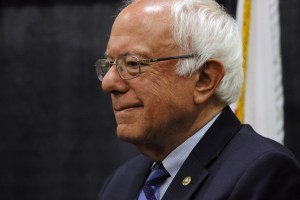Democrats Should Know that Religion Is Not a Litmus Test for Public Office

Just days before the Democratic National Convention began in Philadelphia, Pennsylvania, WikiLeaks released over 20,000 confidential documents from the Democratic National Committee (DNC), including internal emails among key DNC staff members. The emails, dated between January 2015 to May 2016, allegedly show the DNC working to support Hillary Clinton’s campaign over her opponent Bernie Sanders, despite the DNC’s bylaws requiring neutrality in presidential campaigns.
Among the leaked documents was an email sent by Chief Financial Officer Brad Marshall that appears to seek help gaining favor for Clinton over Sanders among religious voters in Kentucky and West Virginia. “It might may [sic] no difference, but for KY and WVA, can we get someone to ask his belief. Does he believe in a God,” Marshall asked in the email.
“He had skated on saying he has a Jewish heritage. I think I read he is an atheist. This could make several points difference with my peeps. My Southern Baptist peeps would draw a big difference between a Jew and an atheist,” he concluded.
The scandal comes at a time when the number of religiously unaffiliated Americans—those who identify themselves as “atheist,” “agnostic” or “nothing in particular”—is growing rapidly. According to the most recent data from the Pew Research Center, 23 percent of Americans—or nearly one in five—are religiously unaffiliated, up from 16 percent in 2007.
Marshall assumed responsibility for the email and apologized in a Facebook post on Saturday evening. “I deeply regret that my insensitive, emotional emails would cause embarrassment to the DNC, the Chairwoman, and all of the staffers who worked hard to make the primary a fair and open process,” he said. “The comments expressed do not reflect my beliefs nor do they reflect the beliefs of the DNC and its employees. I apologize to those I offended.”
Marshall’s comments blatantly disregarded the nonreligious voters who have supported the Democratic Party in this election. According to Pew, more than a quarter of Democratic and Democratic-leaning registered voters are religiously unaffiliated. During the 2016 presidential primaries, 68 percent favored Sanders over Clinton, and when asked to choose between Clinton and Donald Trump, 51 percent chose Clinton.
On Sunday morning, Sanders went on CNN’s State of the Union to make his public statement. “First of all, I am not an atheist,” he said. “It is an outrage and sad that you would have people in important positions in the DNC trying to undermine my campaign, and it goes without saying the function of the DNC is to represent all of the candidates, to be fair and even-minded.”
Sanders was eager to refute the claim that he was an atheist, but he missed a critical opportunity to make the larger point that a candidate’s religious beliefs—or lack thereof— shouldn’t be a litmus test for holding public office. A candidate’s ability to lead shouldn’t be based on whether they believe in a god, but whether they are committed to representing the interests of all Americans. Regardless of his intentions, by neglecting to say this, Sanders has alienated his nonreligious supporters who have come to expect him to represent their interests.
Earlier this year on the campaign trail, activist Justin Scott asked Sanders for his thoughts on politicians who “base a lot of their legislation on their religious beliefs.” Sanders responded, “We have a separation between religion and state. We know how dangerous it is, historically, for governments to get deeply involved with religion. Let’s not confuse and merge religion and state. That is not what our Founding Fathers wanted, and they were right.”
Sanders previously received an 89 percent positive rating from the Secular Coalition for America, the nation’s lobby for nonreligious Americans, for his stance on issues impacting church-state separation. In a 2015 interview with Bloomberg Politics, Sanders condemned Governor Mike Pence, now Trump’s candidate for vice president, for signing the Indiana Religious Freedom Restoration Act (RFRA), which allowed businesses to refuse to serve same-sex couples based on religious grounds.
In 2014, Sanders and a group of senators signed onto a friend-of-the-court brief in the Supreme Court case Burwell v. Hobby Lobby. The brief argued that for-profit companies shouldn’t be able to refuse to cover contraception for their female employees based on religious grounds. When the Court decided 5-4 for Hobby Lobby, he called the decision “very troubling” and co-sponsored legislation seeking to protect women’s access to contraception.
Sanders and the Democratic Party still have a chance to make this right. They can pledge to uphold the Constitution’s prohibition against religious tests for public office and its mandate for the separation of church and state. They can promise to represent the interests of all Americans, including atheists, agnostics, and humanists. They can start by challenging the party’s hostile climate for nonbelievers.
